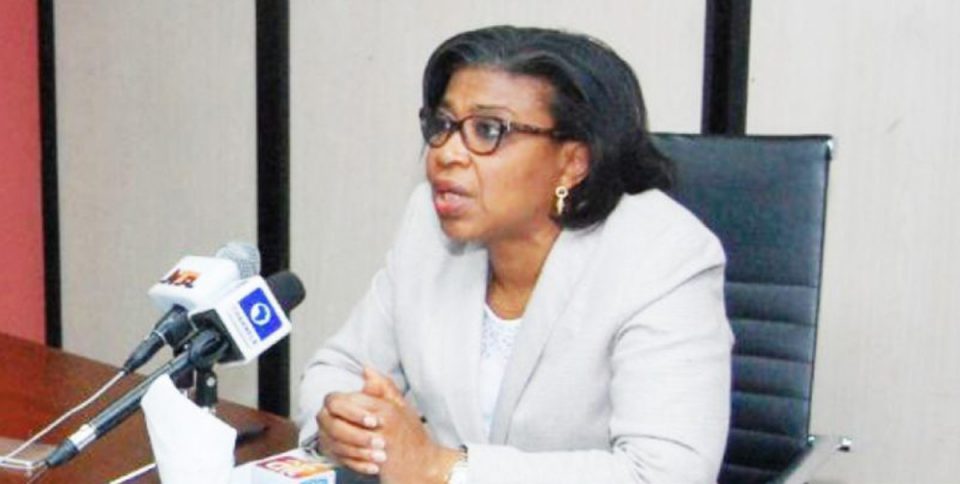The Debt Management Office (DMO) has advised the Federal Government to make efforts to balance its annual budgets and work towards surplus budgets to reduce borrowings.
Patience Oniha, Director-General of the DMO, who gave the advice in an interview on Tuesday in Abuja, said improved revenue generation would help.
The Nigerian media was recently awash with controversy about the country’s increasingly rising debt stock and huge revenue that went into debt servicing.
The controversy was generated by the disclosure by the Minister of Finance, Mrs Zainab Ahmed, that between January and April Nigeria generated revenue of N1.63 trillion but expended N1.94 trillion in debt servicing.
According to Oniha, the figures were contained in the Draft Medium Term Expenditure Framework (MTEF) for 2023-2025, presented by the minister.
“The MTEF put actual revenue and debt service for January to April at N1.63 trillion and N1.9 trillion respectively. The debt service includes debt service of N406 billion on Ways and Advances.
“ The figures show that debt service was higher than revenue. This is by no means a desirable position, but then we need to shift the focus to revenue.
“ How much revenue is Nigeria generating? Statistics show that relative to other countries, Nigeria’s revenue is low,’’ she said.
She cited the World Bank’s World Economic Outlook for 2020, which ranked Nigeria, with a Revenue to GDP Ratio of 6.3 per cent, at 194 out of 196 countries covered.
“A strong and comparable revenue base will not only reduce the need for relatively large amounts of new borrowing as Nigeria has witnessed, but will also reduce the debt service to revenue ratio.
“The DMO has repeatedly emphasised the need to grow revenues significantly in order for debt to be sustainable, ‘’ she said.
The Director-General said that the DMO had continuously maintained its position on the need to raise revenue.
She added that removal of subsidy on Premium Motor Spirit (PMS) would also help to reduce the country’s huge debt burden.
She also called on the Federal Government to take urgent steps to optimise crude oil production, to enjoy the benefits of rising crude oil prices in the International market.
“One issue to be addressed is the PMS subsidy which has significantly increased annual budget deficits and ultimately, increased the level of new borrowings and the public debt stock.
“There is a vital need to ramp up crude oil production and end crude oil theft and pipeline vandalism to meet oil revenue targets, especially in light of rising crude oil prices.
“Other structural issues such as insecurity, inflation, Infrastructure deficit and foreign exchange shortage adversely affecting the business environment need to be resolved.
“This will create an avenue for efficient tax collection and a wider tax base,’’ she said.
Oniha advised the Nigerian media and other stakeholders to also focus attention on challenges of revenue generation.
“It is advisable for the media and public analysts to begin to focus attention on Nigeria’s revenue generation.
“Revenue is the way to go and that is how countries develop and use borrowing to augment revenue shortfalls now and again.
“Nigeria has been running budget deficits for decades; it is about time to shift to balanced budget and even surplus budgets,’’ she said.
She said that the DMO played advisory role to the Federal Government in relation to public debt which covered new borrowing, debt negotiation and debt management strategy.
She urged the Nigerian public to endeavour to get familiar with enabling laws that guided DMO’s operations.
She cited the DMO Establishment Act, 2003 and the Fiscal Responsibility Act 2007, which vested borrowing powers in the executive and legislative arms of government.
“The Annual Debt Sustainability Analysis and the four-yearly Medium Term Debt Management Strategy are tools with which the DMO advises government on policy issues.
“On debt service, the Debt Management Office (Establishment, Etc.) Act 2003, mandates the institution to maintain a record of public debt and service the public debt.
“ For the latter, the DMO actually prepares the Debt Service projections for the MTEF and Annual Budgets so that debt is serviced as at when due.
She said the DMO’s role was an adviser and implementer, adding that the public debt had grown over the last years as government borrowed to meet major revenue shortfalls.
She added that government has had to increase spending on security and infrastructure, as well as funding on health due to the COVID-19 pandemic.
According to her, the levels of new borrowing to meet the needs are often captured in the annual Appropriation Acts and Medium Term External Borrowing Plan.
“Although it looks obvious, one of the things omitted in the analysis by experts is that new borrowing will automatically translate to higher debt stock and debt service levels. ‘’
She said that public debt was the collective decision of the government, adding that rather than blame the DMO, the focus should be more holistic.
She emphasised that focus should be on how Nigeria could generate more revenue and deploy same judiciously.




